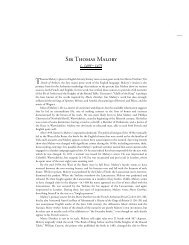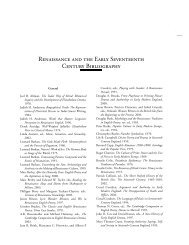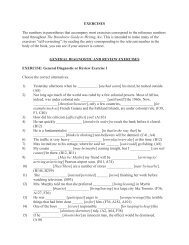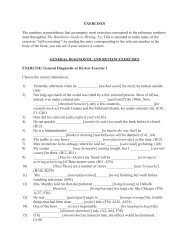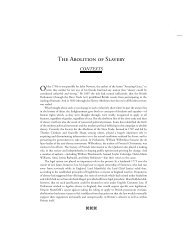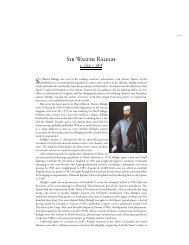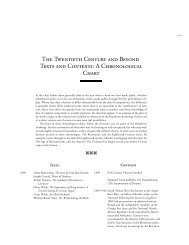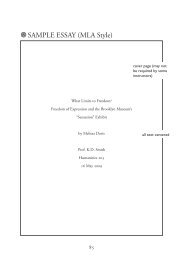Thomas Lodge - Broadview Press Publisher's Blog
Thomas Lodge - Broadview Press Publisher's Blog
Thomas Lodge - Broadview Press Publisher's Blog
You also want an ePaper? Increase the reach of your titles
YUMPU automatically turns print PDFs into web optimized ePapers that Google loves.
1325<br />
1330<br />
1335<br />
1340<br />
1345<br />
1350<br />
1355<br />
towards me. And for this love and duty you<br />
employ on me, I must level out 1 and devise means<br />
to preserve you, which can no better be administered<br />
but by justice, which ordereth all things with<br />
so determined judgement that the good are maintained<br />
for their goodness and the bad punished<br />
for their injustice. Since, therefore, in the entrance<br />
of my government I find cockle 2 that hath choked<br />
the corn, weeds that have overgrown the herbs,<br />
and perverse men who have inverted policy, I will<br />
take the sword in hand like a commander and root<br />
out this cockle from the corn, these weeds from<br />
the herbs, these rebels from the righteous, that the<br />
good may better flourish and the bad stand in<br />
more fear. For which cause, ye Normans, since it<br />
is confessed and approved that Villiers with his<br />
competitors 3 have conspired against the lady<br />
Duchess, my mother, our will is that they perish in<br />
the same fire they provided for the faultless, and<br />
suffer the same punishment they ordained for the<br />
innocent.”<br />
All the whole people applauded his righteous<br />
judgement, and justice was orderly executed,<br />
whilst each one marvelled at his excellency and<br />
wisdom.<br />
After then that he had received homage of the<br />
peers and was invested in the dukedom, at such<br />
time as he was entering Rouen with his lady<br />
mother, the king Pepin with fair Emine richly<br />
accompanied presented themselves. Great was the<br />
gratulations 4 twixt Pepin and Editha, who courted<br />
her in this manner: “Madam, though your son<br />
Robert departed from you a rebel, he is returned<br />
in royalty, being not only Prince of Normandy but<br />
Emperor of Rome, this his lady and wife, these his<br />
followers and well-wishers. So is your sorrow paid<br />
home 5 at last with great solace, and the grief you<br />
have endured requited with gladness.”<br />
1 level out contrive.<br />
2 cockle a weed particularly endemic to cornfields.<br />
3 competitors associates, partners.<br />
4 gratulations manifestation or expressions of joy; rejoicings.<br />
5 paid home repaid completely or thoroughly.<br />
T HOMAS L ODGE<br />
1360<br />
1365<br />
1370<br />
1375<br />
1380<br />
1385<br />
28<br />
Editha when she heard these tidings was ravished<br />
with joy, humbly entertaining 6 Emine, and<br />
honouring her son. Great was the triumph in Normandy<br />
for the liberty of the Duchess, the return<br />
of the Duke, and, after long and festival solace,<br />
Pepin received homage and fealty for the duchy<br />
and returned to Paris in great pomp. Robert,<br />
Emine, and Editha remained in Rouen, till afterwards<br />
being called to Rome upon the decease of<br />
the Emperor, he became of an irreligious person<br />
the only royal paragon of the world.<br />
Epilogus.<br />
Gentlemen, I have given colours to a rare conceit<br />
as full of wonder as worth, as full of perfection as<br />
pleasure, in which I have satisfied humours 7 and<br />
performed history, observing with Apelles 8 the<br />
proportion of lines as Protogenes 9 did the disposition<br />
of lineaments, keeping such method in my<br />
humours as the spheres in the heavens: 10 where<br />
Venus is placed near Mars to correct his malice, 11<br />
and mirth is planted in this discourse to detect the<br />
imperfections of melancholy. If Prosperus 12 seek<br />
for contemplation, he shall find it; if Quintillian 13<br />
for invention, he may meet it. Yet are all things<br />
tempered with that equability that we contemplate<br />
no more than we may avow, nor invent no more<br />
than we can verify. Here may the despairing father<br />
6 entertaining receiving; acting as a host to.<br />
7 humours the dominant dispositions [of the work’s varied readers].<br />
8 Apelles (fl. 4th c. BCE), Greek painter in the time of Alexander<br />
the Great, who specialized in historical and mythological subjects,<br />
and who is generally acknowledged by classical writers as perhaps the<br />
greatest painter who ever lived, particularly for the stunningly life-like<br />
quality of his works.<br />
9 Protogenes (fl. late 4th c. BCE), painter, sculptor, and friendly rival<br />
of Apelles.<br />
10 spheres in the heavens See p. 18, note 5.<br />
11 In ancient astrological lore, the position of one planet relative to<br />
another could qualify, intensify, or negate the influence of said planet<br />
on a person’s life and fortune.<br />
12 Prosperus perhaps St Prosper of Aquitaine (c. 390-c. 463), father of<br />
the early Church.<br />
13 Quintillian Marcus Fabius Quintilianus (c. 35-c. 100 CE), famed<br />
Roman writer and rhetorician, author of Institutio Oratoria (Education<br />
of an Orator).



